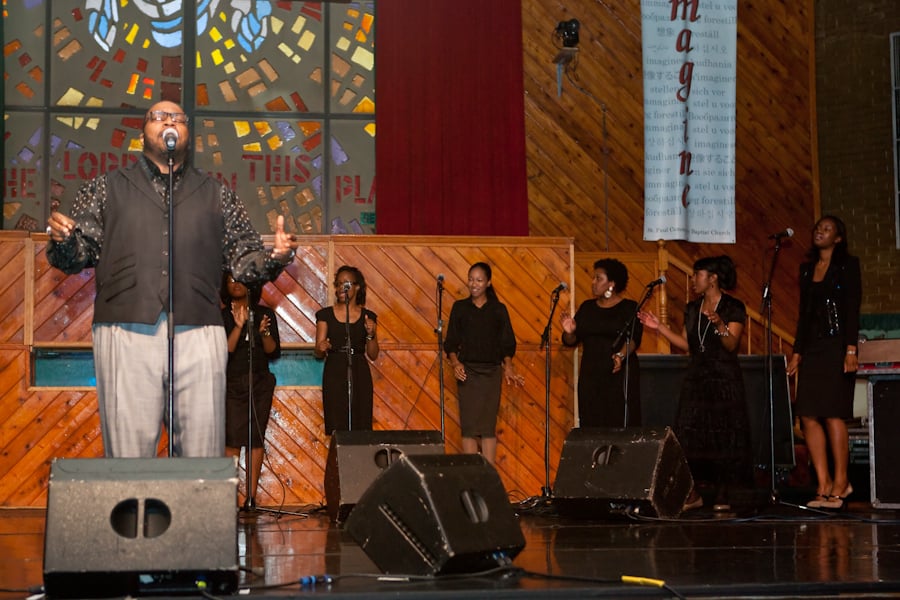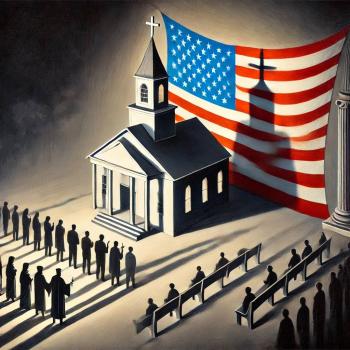
It’s a months-old story that has taken on a new life because of social media. Last summer, well-known gospel singer and Fort Worth pastor Marvin Sapp was speaking at a large Pentecostal convention in Baltimore, MD, when he told the ushers to “close the doors, close the doors, close the doors” until he raised $40,000. (It’s unclear how much money was raised.) Whatever the case, did Rev. Sapp go too far?
Media coverage and online responses told the story in bits and pieces. There didn’t seem to be any one source that contained all the information readers needed in order to fairly assess the incident. And it’s safe to say that few people cared enough to go beyond reading one version of the story.
What Else Should We Know?
Depending on your viewpoint, Rev. Sapp either demanded money or challenged attendees at the 109th Pentecostal Assemblies of the World Convention to contribute $20 apiece during the offering. He also told online viewers that he needed $20 from each of them and proof of their donation, and he wanted $100 from every pastor sitting on the stage with him.
Offerings are a normal part of church services, and it isn’t unusual for churches to use collected money to support the church and pay the pastor. But this wasn’t a normal offering.
Money collected at the convention was needed to cover convention costs, according to Sapp. When a video clip showing the incident recently resurfaced, many people on social media slammed Sapp’s action. Some called his fund-raising tactics “a shakedown,” “hustling,” “coercive,” “insane” and “manipulative.”
Some labeled the pastor “a false prophet” who held convention attendees hostage, while others said they would have called 911 and walked out. Still others created satirical videos about how they would have reacted to the doors being closed, while a few threatened the pastor’s life.
How Has the Pastor Defended Himself?
Pastor Sapp denied several of the allegations made against him and said people have misinterpreted what happened.
- Sapp pointed out that he told ushers to close the doors to the conference room – not lock them, which apparently is true unless new video footage proves otherwise.
- He also explained that the event was a religious convention held in a convention center, not a religious service held at his church. Also true.
- Challenging people to give a specific amount was not unbiblical, he said, and cited 1 Chronicles 29. This Scripture tells the story of the Israelites making donations to build the temple. While it’s a stretch to compare donating to build a temple and donating to pay for a conference, the point was that the Israelites gave.
- Sapp insisted he did not collect the money for himself and did not receive any of the money collected.
Watch the Full Video
Did Rev. Sapp Go Too Far?
Was Rev. Sapp correct in labeling his actions “stewardship”? One dictionary defines stewardship as “the job of supervising or taking care of something such as an organization or property.” Another says the word means “the careful and responsible management of something entrusted to one’s care.” It’s hard to find any “careful and responsible management” in the story.
There also are numerous questions left unanswered.
- Why was Sapp raising $40,000 to cover convention costs at the event? Hadn’t attendees already paid a registration fee? Hadn’t their churches already paid fees to belong to the organization sponsoring the event?
- Were attendees and people watching online told ahead of time that there would be a mandatory donation at the event? How had they felt about this indignity?
- What about the budget? A $40,000 shortage would have gotten me fired during my years in public relations.
- Why did the organization proceed with the event if they didn’t have money to cover it? If they were $40,000 short, why didn’t they cancel it.
You don’t have to be an event planner to know you need a budget, and you need to stay within it. Scrambling to solve problems that arise because you didn’t have a solid, well-thought-out plan in place is totally unacceptable.
And demanding more money from attendees who have presumably paid to attend the convention is offensive.
What Were Rev. Sapp’s Motives?
There are more questions than answers. In defending himself, the Rev. Sapp pointed out that the event was a convention held at a convention center, not a church.
Sapp explained his motives this way: “The truth is, when finances are being received in any worship gathering, it is one of the most vulnerable and exposed times for both the finance and security teams. Movement during this sacred exchange can be distracting and, at times, even risky.”
What did he mean? “Close the doors” smacks of coercion, as if he expected attendees to walk out and wanted to stop them.
Or did he expect thieves to raid the conference room? A closed door wouldn’t have stopped them.
And why would anyone need to move around while the collection plates were being passed around?
Why did he say “this sacred exchange” of money might possibly be “risky”?
“My directive was not about control,” he further insisted. “It was about creating a safe, focused, and reverent environment for those choosing to give, and for those handling the resources,” the media company BET quoted Sapp as saying.
One More Reason to Dislike Christians
Whatever the motives, the person or group in charge of fundraising gave opponents of Christianity one more reason to criticize or attack Christians and the church.
Some critics already believe pastors and Christian churches approach true believers with their hands stretched out for money.
If you’ve ever watch preachers on television, you may notice that they always ask for donations. Then later, you may hear or read about their lavish homes, cars and personal airplanes.
Christians also are often accused of being self-righteous hypocrites. They’re right in many instances. We talk about loving our neighbors, but many of us are guilty of racism and hatred of the LGBTQ+ community, immigrants and others who are different.
We judge them and find them lacking. And yet, many so-called Christians support the most immoral man who has ever occupied the Oval Office.
Sadly, most of these aforementioned accusations cross denominational lines.
Did Rev. Sapp Go Too Far? Did We?
Did Rev. Sapp go too far? Yes. But complaining on social media won’t do any good.
If you want to complain, make a complaint where it might make a difference. Contact the Pentecostal Assemblies of the World, Inc., which sponsored the conference, on their Facebook page.
Did people on social media go too far? Definitely, but attacking someone for entertainment purposes on social media spreads hate – and America has enough of that. And even if Rev. Sapp were coercing people at the convention, he doesn’t deserve the death penalty.
















